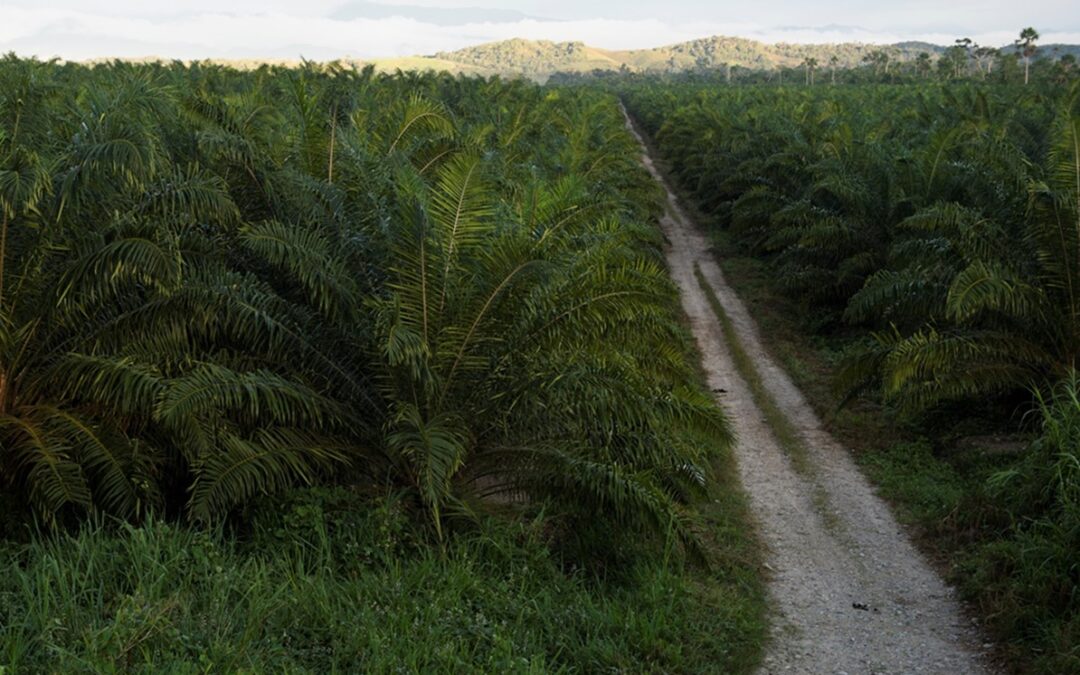
Apr 22, 2021
Marking this year’s April 22 Earth Day, the Solidarity Center is launching a new, partner-informed, inclusive strategic plan to support workers and their unions around the world to address impacts and drive solutions for an accelerating climate crisis.
“The Solidarity Center recognizes that workers and their communities—especially in the global south—are disproportionately impacted by the climate crisis. We are committed to directing resources and attention toward people-centered climate policy and legislative advocacy by our partners and allies in their respective countries,” says Shawna-Bader Blau, Solidarity Center executive director.
The Solidarity Center’s strategic plan—centered on ensuring decent work and a strong labor movement in the future—endorses the following program and advocacy approaches:
- Developing worker-driven climate solutions and playing a significant role in their implementation to protect hard-fought gains and advance worker rights in changing industries
- Using collective bargaining to advance cleaner, safer and more sustainable operations across sectors; and ensuring an inclusive process that prioritizes the needs of workers and their communities in transitioning sectors
- Building broader coalitions, securing the mutual commitment of climate, human rights and community organizations in the fight to win decent, unionized green jobs; building healthy, resilient and sustainable communities; and supporting worker rights
- Effectively participating in national, regional and global climate justice negotiationsand holding policymakers and employers accountable for achieving a just transition to a cleaner economy that enables workers to enjoy their fundamental freedoms and rights; and
- Advancing an enabling legal environmentto achieve a just transition, recognizing the critical link between labor rights and environmental justice.
“On Earth Day, the Solidarity Center stands with our partners as they drive the vision for a fair or just transition to a cleaner, more inclusive, and more equitable economy,” says Sonia Mistry, Solidarity Center global lead on climate change and just transition.
Read more here.
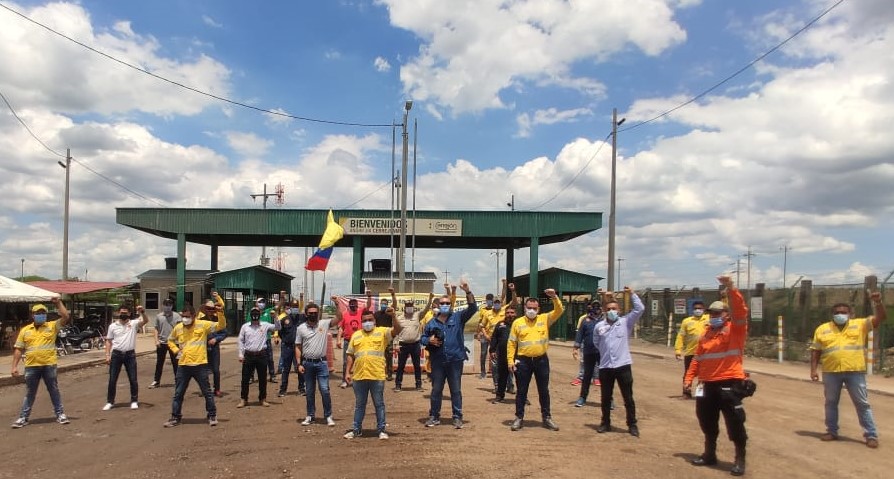
Apr 7, 2021
Organizations representing Colombia’s energy and mining sector workers are supporting the country’s transition to cleaner energy while preserving decades-long, hard-fought progress in turning often unsafe and poorly paid jobs into safer, family-sustaining livelihoods.
A joint declaration signed late last year formalizes the commitment of Colombia’s national labor federation Central Unitaria de Trabajadores–CUT and three of its largest mining- and energy-sector unions—Sintracarbón, Sintraelecol and Unión Sindical Obrera (USO)—to an urgent national effort to abandon fossil fuels and adopt new technologies, assuming those policies prioritize:
- National policies that support full compliance with Paris Agreement goals
- Government oversite of such policies, including all climate interventions implemented by private mining and energy companies in Colombia
- The preservation and strengthening of decent work in mining and energy sectors, and of their unions.
“Colombian energy- and mining-sector workers—and the communities they sustain—must participate in every step of the process to ensure workers’ rights to safety and good jobs are supported by the country’s energy transition policies,” says Carlos Guarnizo, Solidarity Center Colombia-based program coordinator.
“Transition to a new energy agenda should be negotiated with us and the rest of society,” to ensure a fair and democratic model of energy production, says the declaration. Energy- and mining-sector workers should be consulted because they have the knowledge and experience to conceive, propose and advance the discussions that will shape the policies on transition to clean energies. Declaration signatories will be working in coalition with one another, as well as with academics, social and environmental justice movements and the international community, to devise such a model.
“On Earth Day, the Solidarity Center stands with Colombian energy- and extractive-sector unions—and all others around the world—as they drive the vision for a fair or just transition to a cleaner, more inclusive, and more equitable economy,” says Sonia Mistry, Solidarity Center global lead on climate change and just transition.
The Intergovernmental Panel on Climate Change (IPCC) found that emissions from fossil fuels are the dominant cause of global warming. Carbon dioxide emissions increased by almost 90 percent from 1970 through 2011, with emissions from fossil fuel combustion and industrial processes contributing almost 80 percent of that increase. About 50 percent of Colombia’s electrical-generation capacity is in the hands of privately owned companies.
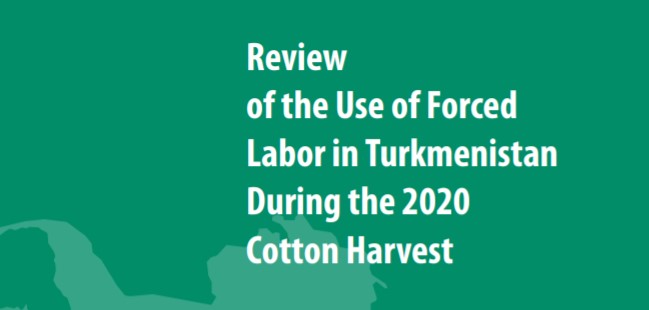
Mar 25, 2021
Cotton bound for global markets from Turkmenistan—the ninth largest producer and seventh largest exporter of the world’s cotton—was again harvested with forced labor last year, finds a new report by the Turkmen Initiative for Human Rights and turkmen.news. Students and public-sector employees—including teachers—were systematically forced into the cotton fields in four of Turkmenistan’s five regions during the 2020 fall harvesting season, documents the report.
“The Turkmen government consistently denies the use of forced labor in the country during the cotton harvest despite abundant evidence to the contrary,” says Ruslan Myatiev, turkmen.news editor and human rights defender.
The report documents the forced participation—under threat of dismissal from their jobs or expulsion from their educational institutions—of public-sector employees and high school, vocational and college students. Report findings are based on evidence documented by trained civil society monitors working for the Turkmen Initiative for Human Rights in four of the five regions of Turkmenistan: Ahal, Dashoguz, Lebap and Mary. Women are especially vulnerable to forced labor in the country because they comprise most of the public-sector workforce traditionally involved in the cotton harvest, says the report.
Public-sector workers, including teachers, were expected to provide so-called voluntary contributions from their salaries or in personal time worked in the fields, or a replacement worker—often their students—for “successful achievement of the state plan for the cotton harvest,” states “Review of the Use of Forced Labor in Turkmenistan during the 2020 Cotton Harvest.” For example, during the country’s eight-day fall break, starting October 22, all teachers in the schools in the Dashoguz region had to pick cotton or pay for a replacement worker to go to the fields.
Forced labor of teachers, doctors and other public-sector employees is crippling health and education public services, says the report, while extortion of money from such employees is exacerbating citizens’ suffering during the country’s worsening economic crisis in the context of COVID-19-related food shortages and rising prices.
“Together with other members of the Cotton Campaign, the Solidarity Center demands respect for international conventions against forced labor. Nobody should be coerced into working the fields, and those who monitor working conditions in the cotton fields must be free to do so,” says Abby McGill, Solidarity Center senior program officer for Eastern Europe and Central Asia.
In Turkmenistan, a Central Asian republic on the northern border of Iran and Afghanistan, cotton cultivation is fully controlled by the state, retaining elements of the planned economy from the Soviet era. It is one of the most closed and repressive states on the planet, currently ranked below North Korea in world freedom scores. The government commits egregious human rights abuses with impunity and there is a total absence of free media. Cotton-sector independent monitors and reporters face ongoing harassment, arbitrary imprisonment, and torture and ill-treatment.
The U.S. State Department ranked Turkmenistan Tier 3, the lowest ranking on its annual Trafficking in Persons report. Cotton from Turkmenistan is on the Labor Department’s list of goods produced with child or forced labor, and the U.S. Customs and Border Protection agency (CBP) prohibits the import of cotton or cotton products from Turkmenistan.
The Cotton Campaign is a global coalition of human rights, labor, responsible investor and business organizations dedicated to eradicating child and forced labor in cotton production in Turkmenistan and Uzbekistan. The Cotton Campaign’s Turkmen Cotton Pledge, committing signatories to preventing cotton from Turkmenistan produced with forced labor from entering their supply chains, has been signed by 119 major apparel and home goods brands and industry associations.
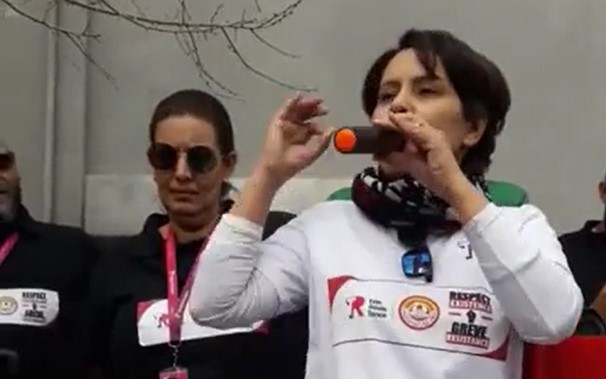
Mar 19, 2021
Citing dangerous work conditions and inadequate wages, an imminent call-center strike was announced this week by French union Solidaires Unitaires et Démocratiques (SUD), with the Moroccan Labor Union (UMT) and Tunisian General Labor Union (UGTT). The strike will target all company sites in France, Morocco and Tunisia on March 24 and 25, said the unions in a joint statement.
Headquartered in France, Teleperformance has more than 300,000 employees across 450 contact centers in 83 countries and serves more than 170 markets. Media outlets have reported on the overcrowding and endangerment of its employees in many countries, including France and Greece, and in Portugal where health authorities ordered the closure of a center.
Health and safety complaints cited in the strike announcement include that workers:
- Are sleeping on the floor in call centers in the Philippines
- Are endangered by insufficient personal protective equipment, including masks, inadequate social distancing and a requirement that they share workstations—including headsets and computers—without adequate cleanup between shifts
- Have their salaries withheld for refusing to work under such unsafe conditions
The strike announcement also calls for wage increases, given Teleperformance’s profitability and the risks faced by workers.
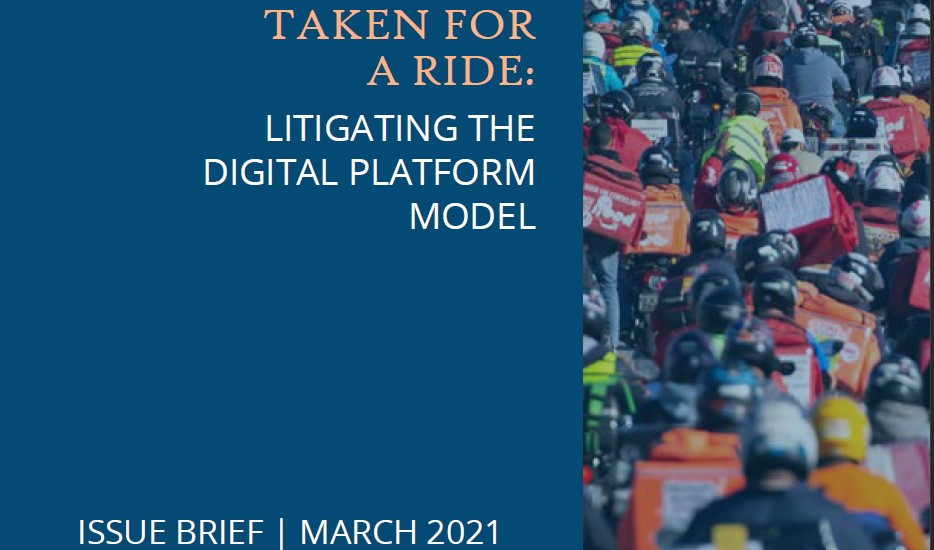
Mar 17, 2021
Gig economy companies employ multiple strategies that undermine gig worker rights around the world, according to a new issue brief by the International Lawyers Assisting Workers (ILAW) Network, a project of the Solidarity Center.
“Taken for a Ride: Litigating the Digital Platform Model,” released today, analyzes how companies such as Deliveroo, Foodora and Uber deprive couriers and drivers of their basic employment rights globally.
“The collection of cases analyzed in this report reveals the extraordinary extent to which these companies are embroiled in litigation around the world,” write co-authors Nicola Countouris, labor law professor at University College London (UCL) and research department director for the European Trade Union Institute (ETUI), and Jason Moyer-Lee, a fellow at Georgetown University’s Kalmanovitz Initiative for Labor and the Working Poor.
The brief details a string of losses for gig economy companies, including before the highest courts of France, Spain and the United Kingdom, and in lower tribunals from South Korea to Uruguay. Such worker victories have come at great cost and, due to weak enforcement regimes, gig economy companies often do not extend rights even after losing cases, concludes the report.
In countries where companies have seen more success—such as South Africa and the United States—the analysis shows how gig economy employers have deployed multiple tactics to pull off the victories, such as forcing workers into arbitration, making them sign complex and convoluted contracts, or relying on an international corporate structure.
The brief recommends gig workers pursue strategic litigation, complemented by collective action, campaigning and communications strategies targeted at local lawmakers, with a special focus on enforcement. And governments, the brief states, “must proactively and rigorously enforce the law,” while applying penalties stiff enough to dissuade unlawful behavior.
“These companies have gone to great lengths to insulate themselves from responsibility and have put an extraordinary burden on workers to claim their basic rights at work. Governments must step in now and enact legislation that protects the rights of all workers providing labor to a digital platform company,” says Solidarity Center Rule of Law Department Director and ILAW Network co-founder, Jeffrey Vogt.
The report was made possible with funding from the Ford Foundation.





